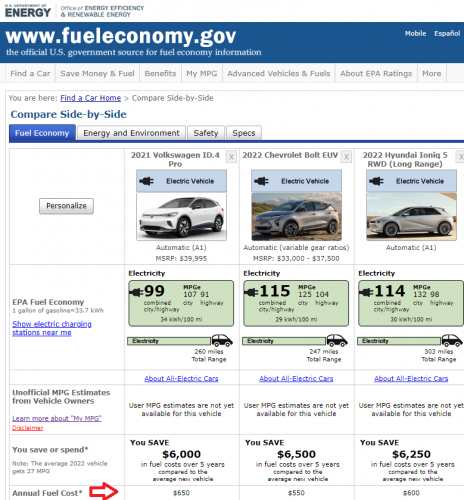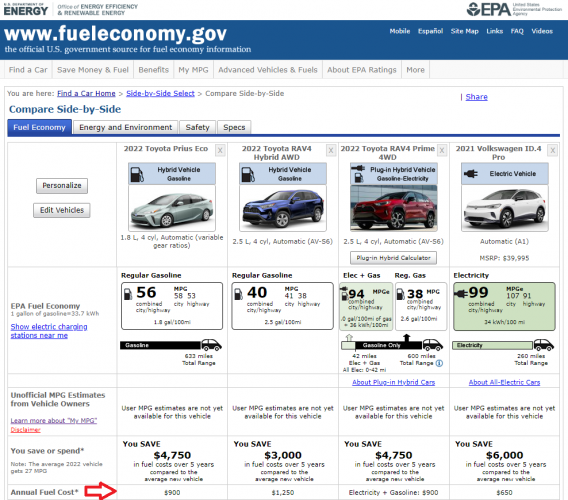One of the best things about electric vehicles (EVs) compared to old-school gassers, called ICE by EV fans, as in “internal combustion engine” vehicles, is the savings on energy one can enjoy. Electric vehicles are the most energy-efficient vehicles one can buy. This translates today into big savings on your total cost of ownership by comparison to a conventionally-powered vehicle. How much will depend almost entirely on the vehicle to which vehicle you compare an EV. Interestingly, the choice of which EV matters very little.

EVs Are All “Equally Efficient”
EV fanatics will go nuts by this section of the story, but the truth is, all EVs are nearly equal when it comes to energy costs. Of course, there are differences, but in the context of how much one can save on energy costs compared to buying an ICE vehicle, the minor differences in the efficiency between various EV models are pretty much meaningless. We will explain this in the detailed comparisons we have ahead in the story, but first, let’s do a quick reality check on ownership costs.
Total Cost of Ownership
The total cost of ownership of an automobile is both easy to understand and difficult to pinpoint. The 20-year ownership costs of an EV in order of their magnitude are as follows:
Depreciation ($35,000)
Insurance ($15,000 - 20,000)
Energy costs ($12,000)
Taxes (In Massachusetts $7,500)
Maintenance and repairs ($5,000 - $15,000)
Charging equipment and infrastructure costs ($0 to $7,000)
Registration and RMV fees ($2,000+)
Finance costs (If any)
Total 20-year cost of ownership Of An Affordable EV = $76,500 - $103,500
Related Story: Consumer Reports: PHEVs Like RAV4 Prime Have Lower Maintenance & Repair Costs Than BEVs Like Tesla Model Y
Depreciation is so much larger than the remainder of the cost types it is hard to overstate. An affordable vehicle with an out-of-pocket cost of $30K- $35K will depreciate about $3,000 to $3,500 per year, and the depreciation is higher in the beginning and end than it is in the middle. Yes, in today’s crazy unique market used vehicles are holding their prices very well. It may continue, or in two years we may be back to a market enjoying a glut of vehicles.
In this story, we will focus on the difference between an EV, meaning a battery-electric, or battery-only vehicle, compared to a conventional vehicle. We are also going to focus on “affordable” or one might say, “attainable” vehicles. As you will see, it doesn’t really matter which electric vehicle model one selects, the EV energy costs are about the same, and how one might calculate the differences in energy costs are also the same.
Your Best Resource - www.fueleconomy.gov
Let’s not drag this out if you are interested in how to quickly determine the approximate costs of your energy for a given EV. Simply go to www.fueleconomy.gov and look up your vehicle. We’ve posted up a handful of models above for you to check out. We opted for three compact crossover-style EVs with an approximate cost to the consumer of around $30K to $35K after incentives, but before dealer market adjustments. As you can see, the difference in energy costs is pretty small, about $100 per year between the various models and brands.
The EPA’s website uses the average cost for electricity in America, and 15,000 miles traveled to come up with this estimate. If you have a higher or lower cost for energy in your particular home or area, and if you drive more or less, this number will change accordingly. However, there is little difference from model to model, and compared with a cost of ownership of about $4,500 per year, a $100 annual difference in energy is meaningless.

Comparing Traditional Gas Vehicles To EVs
Let’s do a quick comparison using the single most popular gas-powered vehicle in this segment. That model is the Toyota RAV4. The RAV4 has an annual energy cost that is about $1,000 more per year than the battery-electric vehicles on our examples listing. That sure is meaningful. Over a possible 20-year lifespan that vehicle would cost its owner(s) about $20K more in energy costs. That is about 75% of the depreciation cost of that vehicle. In a nutshell, the traditional gas-powered vehicle is dramatically-higher in cost for energy than is the battery-electric vehicle. Now let’s get real. Why not compare the “green” battery-electric vehicle to some other green choices that use gasoline?
Comparing Battery-Electric Vehicle Energy Cost to Other Green Options
The choice between a conventionally-powered gasser to a green vehicle didn’t start with EVs, but rather hybrids. The Prius and other hybrid models have been cutting fuel costs in half or more for three decades. But the Prius is a ringer. Its size and mission don’t overlap that of a crossover very well. So let’s not use the Prius with its $900 per year energy cost, and instead look at the top-selling green crossover in America, the Toyota RAV4 Hybrid AWD.
This RAV4 Hybrid AWD has an annual cost of energy of $1,250, or about double the energy cost of a battery-electric vehicle. With an annual added cost for energy of $650 or so, the RAV4 Hybrid AWD will cost its owner(s) about $13,000 more in energy than a battery-electric crossover would.
Finally, let’s compare the most efficient option that can accept gasoline, a plug-in hybrid-electric (PHEV) crossover, the RAV4 Prime. Its energy cost per year is about $300 higher than a battery-electric crossover. So, over 20 years, it will cost its owner about $6,000 in energy more than a battery-electric vehicle. Is this a meaningful difference? Many would argue it is if all things were equal. However, a RAV4 Prime has features that no battery-electric vehicle in its class offers. Three simple features that jump to mind are standard AWD, a 600-mile range between needing energy on long trips, and a spare tire in case of emergency. This particular comparison will vary depending on the ratio of electricity to gasoline used by its owner. Many owners primarily use electricity. Some use a mixture with more hybrid miles being traveled.
Related Story: Truth Unplugged - Data Helps Disprove Critics’ Main Complaint About Plug-In Hybrids
It’s Not Hard To Calculate Energy Savings
We didn’t do any math other than addition, subtraction, and multiplication in our heads for this story. There are no formulas needed to determine how much one can save on energy by switching to an EV. If you wish to go down a rabbit hole trying to calculate your exact cost of energy by determining your average energy consumption per mile and then multiplying by your cost for energy and your expected miles traveled, go for it. Math is fun, right? However, the annual difference between your energy cost and your neighbor's for a similarly-sized EV driven about the same distance won’t add up to a meaningful difference in your total cost of ownership.
Conclusion - How Much Money Is Saved By Switching to an EV
If you live where harsh winters are not a problem, don’t take weekly road trips, and own your own home (where you can charge), an EV is a slam dunk. An EV is nearly always a great second or third vehicle option if you have an at-home charging solution or aren’t bothered by the annoyances of public charging. Switching your primary or secondary vehicle to an EV can save you tens of thousands of dollars on energy compared to an equivalent old-school gas-powered car. Not interested in the limitations that EVs place on ownership? A hybrid or plug-in hybrid can still save you tens of thousands of dollars in ownership costs over the life of your vehicle.
Image of Bolt being charged by John Goreham. Energy charts courtesy of the EPA.
John Goreham is a long-time New England Motor Press Association member and recovering engineer. John's interest in EVs goes back to 1990 when he designed the thermal control system for an EV battery as part of an academic team. After earning his mechanical engineering degree, John completed a marketing program at Northeastern University and worked with automotive component manufacturers, in the semiconductor industry, and in biotech. In addition to Torque News, John's work has appeared in print in dozens of American news outlets and he provides reviews to many vehicle shopping sites. You can follow John on TikTok @ToknCars, on Twitter, and view his credentials at Linkedin
Re-Publication. If you wish to re-use this content, please contact Torque News for terms and conditions.
Set as google preferred source












Comments
The fuel efficiency numbers
Permalink
The fuel efficiency numbers are not correct. If we assume that it takes around 30KWh for 100 miles, in California the electricity costs around 36 cents per KWh.
That is $11. Even at today's prices that is 2.3 gallons of 87 gas. My Honda Accord runs 30 mpg on average. 100 miles in a gas car will cost me $16.
In other words, an electric car that takes 30 kWh runs 43-44 mpg, not 100.
When gas prices are $2.50 (instead of $4.80 in my calculations), the cost of a gas vehicle is way lower - my gas Honda Accord would cost $8.50 / 100 miles, versus $11 for an electric. Also, keep in mind that you need to replace the battery for a huge amount of money when it is out of warranty AND the electric version costs more money to begin with, maybe 50% more. So, overall a gas car is way more economical to drive.
Thanks for your comment Senia
Permalink
In reply to The fuel efficiency numbers by SeniaO (not verified)
Thanks for your comment Senia. I used to correct folks who said, 'You have to replace the battery..." Then GM literally had to replace every Bolt battery. So it's no longer untrue. Cheers,